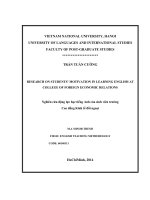Role play tiếng anh (trường cđ kinh tế đối ngoại)
Bạn đang xem bản rút gọn của tài liệu. Xem và tải ngay bản đầy đủ của tài liệu tại đây (79.09 KB, 6 trang )
Trường Cao Đẳng Kinh Tế Đối Ngoại TPHCM
TÀI LIỆU TIẾNG ANH
(ROLE PLAY)
Bộ mơn: Tiếng Anh Tài Chính Ngân Hàng
ROLE l:
A: Good morning, Mỹ. Have a nice day!
B: Ok Mức. Thanks. Have a nice day, too!
A: Thanks. Hey Mỹ. Our bank has just offered ''e - saver'' account.
B: Oh. Really? It is coincidence! Our bank have just offered “ regular saver”
account to customers. Could you tell me some information about your service to
compare the terms and conditions of 2 kinds of account. It’s very interesting for
customers who want to open the account.
A: Ok, go ahead! I think it is very necessary.
B: That's right. Do you know how much minimum deposit can customer open
account?
A: Of course. I know. It’s £1. Beside that it not only provides telephone and
Internet banking but also allow customer to withdraw immidiately.
B: Hmm. It likes our “ regular saver” terms and conditions. Also, How about
overdraft facility, higher interest rate for higher balances, monthly deposit each
month and ATM card.
A: “ e-saver” account doesn’t offer overdraft facility and higher interest rate for
higher balances for customers. I think it only suits for parent or business
because it doesn’t ATM card but it can help customers pay bill without going to
the bank.
B: I know. In our bank, “ regular saver” account has offered all terms and
conditions. Only arrange transaction online doesn’t implement. As far as I know
students and employees likely use this account because it has automatic
withdraw system. It’s advantage for them.
A: Yes, I see.
B: Ok, Each account has different terms and conditions to choose. Thank you
for your information. Good bye!
A: No problem. Bye.
ROLE 2:
A: Good morning, Mỹ. Have a nice day.
B: Ok. Mức. Thanks. Have a nice day, too.
A: Thanks. Mỹ. As you know, our MGS bank are considering whether to invest
substantially in its 30 branches, or whether to try to encourage its customers to
use the telephone and internet. So, now, I want to discuss this problem with you
and make the best choice. Do you have any idea?
B: I think we should invest substantially to 30 branches. Because I find that
recent research shows that attractive branches bring in customers who will buy
more banking products. So, I expect that a majority of customers will always
prefer to go to a bank branch. What do you think?
A: Yes, I understand what you mean. But I'm not sure I agree with you there. I
believe that within few years online banking will inevitably lead to closure of
most branches. People will only use their internet connection and telephone,
cash dispensers, and will hardly need to go into a branch. So, I think we should
encourage customers to use it.
B: I'm not sure. I think most of customers will always prefer to go to a bank
branch. Because of, Internet banking is complicated with many people.
A: So, what will you do to improve bank branches?
B: I think we should invest substantially in relocating branches in shopping
centers, and redesigning them - making them friendlier, selling refreshments,
opening longer hours, and so on. I would like larger counselling areas, where
financial advisors could recommend banking products and services to
customers, and deal with their problems.
A: We can't find clearly benefits of branches. Beside that, these are mostly older
people who have never used computers, and this will not be the case in the
future.
B: Why do you think that?
A: Consequently I think that any money spent on improving branch services
will be wasted. The bank’s IT staff do not need offices in expensive locations
like high streets or shopping malls.
B: Ok. I understand. Let's show me what will you do?
A: We can invest to improve intemet connection and a variety services. If our
customers are business people or officer, they will not bring a huge amount of
money to go out for shopping or investing. So, they just need smartphone or
card to pay anything.
B: Ok. That sounds nice. And I agree with your idea. Can you handle this?
A: Yes, I will do it right
B: Thanks for your suggestion. Now, I must go to the personnel officer. See you
again.
A: Ok. Bye bye.
ROLE 3:
A: Good morning, Mỹ. Have a nice day!
B: Ok Mức. Thanks. Have a nice day, too.
A: Yes, thank. As you know, today we’ll discuss to choose the priority customer
who our bank should make the loan. Let’s look at two loan applications and give
me some your opinion.
B: In my opinion, I'll choose the film production company. They needs to
borrow $2 million to complete a movie currently in production. And the loan
would be repaid in nine months’ time when the film is released, if it is
successful.
A: I don't think I will agree with you! This company has not made a profitable
film for three years, so the risk of non- payment becomes too great.
B: I know you are worried. However, the film features two actors who have
made a lot of successful films in the past, which can attract attention from much
people and they can expect high turnover.
A: um hum! I think you are very optimistic.
B: So, what about your suggestion?
A: Personally, I think the manufacturing computer components should be
priority. Its factory is operating 16 hours a day and the company is producing
and selling twice as much as expected.
B: I think that’s a quite impressive result. However, it has to pay its suppliers
after 30 days, and its customers only pay after 60 days, so it has an enormous
cash flow problem. Are you sure this company can have ability to pay interest
and repay loan? In addition, the credit line the company has arranged is
inadequate.
A: You may be right! But I’m still not confident to think the film production
company is an alternative selection.
B: I see. But, remember that riskier loans can be more profitable for the bank.
A: oh. I think you persuaded me. Can you make a preliminary recommendation
to present to Board?
B: I’ll do that. I think that’s all. Would you like to go out for lunch?
A: Good idea! See you later.
B: Goodbye!
ROLE 5:
Role 5
A: (calling)...
B: Hello ! Bank's call centre is speaking. How can I help you?
A: Hello. I'm calling from Capper Trading. We have a couple of export orders
coming up, but we don't know how we have to arrange transport, insurance,
custom documentation and so on. So, I want to know at all clear about some of
the conditions.
B: Well. Perhaps I can clarify them for you. That's what I'm here for! What do
you want to know?
A: Ok. Can you tell me how FAS and FOB terms are different?
B: Of course. As you know. FAS means ''Free Alongside Ship'', This price
includes transport as far as the port, the buyer pays for loading onto the ship,
shopping and insurance. Also, FOB means ''Free On Board'', in other words the
seller's price also includes the cost of loading the goods onto the ship.
A: Sorry, I don't quite follow you. Can you explain it again?
B: Well. Easier to understand than FAS terms, the cost of loading the goods onto
the ship will be paid by the buyer. Otherwise, in FOB terms, this cost will be
paid by the seller.
A: Oh. I understand. So, the difference between DES and DEQ? How?
B: You want ask DES and DEQ. Right?
A: Yes
B: DES means "Delivered Ex Ship". It is defined as the seller makes the goods
available to the buyer on board the ship, whereas DEQ means "Delivered Ex
Quay ( Duty Paid )" the seller makes the goods available to the buyer on the
quay or wharf, and pays the import duties.
A: Umm... Sorry! Did you mean by the DES terms, the seller will deliver the
goods to the buyer on board the ship and the DEQ terms, the goods will be
delivered on the quay or wharf?
B: That's right !
A: Ok. And, can you tell me under which circumstances the seller is responsible
for arranging and paying for insurance against damage to the goods during
transportation?
B: In the CIF and CIP terms. In addition, also have the D terms group includes
DAF, DES, DEQ, DDU and DDP.
A: Sorry. Did you say "DIF"
B: Yes, CIF. It means Cost, Insurance and Freight.
A: Ok. There are CIF, CIP, DAF, DES, DEQ, DDU and DDP terms, right?
B: Well. That's right.
A: And, finally, I don't know that whether DDU ( Delivered Duty Unpaid) and
DDP (" Delivered Duty Paid) apply in the European Union.
B: Of course. Both terms apply in the European Union.
A: Oh right. Ok, thank you very much.
B: My pleasure. Good bye.









